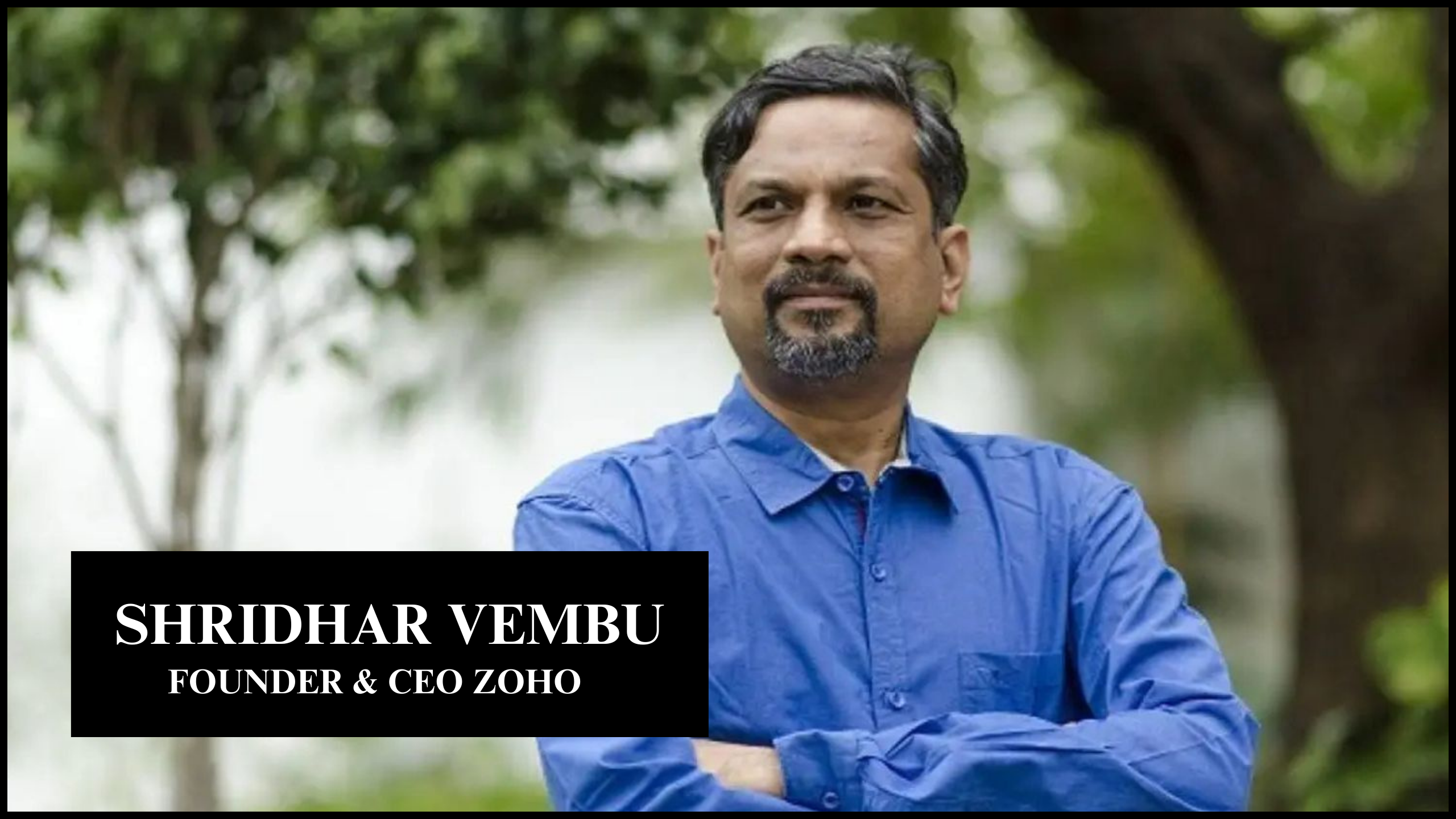Shridhar Vembu From Rural Roots to Global Tech Titan - The Inspiring Journey of Zoho's Visionary Founder
Shridhar Vembu is the co-founder and CEO of Zoho Corporation, a global software company known for its suite of cloud-based business applications. His journey from modest beginnings to establishing Zoho as a leading technology company is inspiring.
Humble Beginnings and Education
Shridhar was born in a small village in Tamil Nadu, India. His family emphasized the importance of education, which led him to pursue a degree in Electrical Engineering from the Indian Institute of Technology (IIT) Madras. Later, he went to Princeton University for his Ph.D. in Electrical Engineering, showcasing his strong academic background and aptitude in technology.
Founding ZOHO
In 1996, Vembu co-founded AdventNet (later renamed Zoho) in Silicon Valley, USA. Initially, the company focused on providing network management solutions. However, challenges during the dot-com bubble burst forced them to rethink their business model. Vembu made the critical decision to pivot toward developing affordable, cloud-based business applications aimed at small and medium-sized businesses.
Shift to India and Rural Empowerment
Shridhar Vembu made a bold move in 2004 by relocating a large portion of Zoho’s operations to India. Rather than establishing offices in major cities, he set up centers in rural areas to offer employment to local talent.
His vision was to create job opportunities where they were scarce and encourage skilled workers to stay in their hometowns rather than migrate to cities.
This decision highlighted his belief in self-reliance and social responsibility, as he invested in training young people from villages in programming and other skills required to work in the software industry.
This unique model allowed Zoho to keep costs low, maintain high employee loyalty, and contribute positively to the rural economy.
Rise of Zoho as a Global Player
Under Vembu's leadership, Zoho grew into a prominent player in the SaaS (Software as a Service) industry. Zoho’s product suite includes over 45 applications, covering everything from CRM to project management, finance, and HR. The company serves millions of users worldwide and has become a competitive alternative to giants like Salesforce and Microsoft.
One of Zoho's most remarkable aspects is that it has remained privately owned and profitable, without reliance on external funding. This independence allowed Zoho to prioritize innovation and customer satisfaction over short-term financial pressures.
Recognition and Legacy
Shridhar Vembu’s approach to business and rural empowerment has earned him widespread recognition. In 2021, he was awarded the Padma Shri, one of India’s highest civilian honors, for his contributions to the trade and industry sectors. Vembu’s story is celebrated as a testament to the power of entrepreneurship, a commitment to social responsibility, and the potential of India’s rural talent.
Key Takeaways from Shridhar Vembu’s Success Story
Empowerment Through Education: He emphasizes building talent in rural areas and creating opportunities for local communities.
Sustainable Business Growth: By remaining privately owned and focused on steady growth, Vembu has built a resilient and sustainable business.
Social Responsibility: He leveraged Zoho to make a social impact by generating rural employment, demonstrating a business model that combines profitability with community development.
Innovation and Customer-Centric Approach: Zoho’s success also underscores the importance of continuous innovation and delivering value to customers.
Shridhar Vembu Net Worth
As of the latest estimates, Shridhar Vembu's net worth is approximately $3.8 billion. His wealth primarily comes from his stake in Zoho Corporation, which he co-founded and has grown into a successful global software company.
Vembu has maintained Zoho as a private, self-funded company without external investment, allowing it to grow organically and profitably.
This has contributed significantly to his net worth, as Zoho continues to expand its suite of business applications and customer base globally. Additionally, his net worth has made him one of India’s wealthiest tech entrepreneurs, widely respected for his rural empowerment initiatives and unique approach to business growth.
Funding and Marketing Strategy
Shridhar Vembu’s approach to funding and marketing for Zoho Corporation has been unconventional yet highly effective. Here’s a look into both aspects:
Funding Strategy: Bootstrapping and Self-Reliance
One of the most unique aspects of Zoho’s growth story is that it has been entirely self-funded. Shridhar Vembu has consistently avoided external investors, choosing instead to bootstrap the company from the ground up. This strategy is rooted in his philosophy of financial independence, which he believes allows Zoho to prioritize customer satisfaction, innovation, and steady growth without the pressure to meet investor demands.
Key Elements of Zoho's Funding Strategy
Revenue Reinvestment: Zoho has used its revenue to fuel growth, investing in product development, talent, and infrastructure.
Cost Efficiency: By moving much of the company's operations to rural areas in India, Vembu has kept operating costs low, allowing Zoho to offer high-quality products at competitive prices.
Slow and Steady Growth: Instead of aggressive expansion, Zoho has focused on sustainable growth, introducing new products only when it makes financial and strategic sense.
This self-reliant approach has given Zoho the freedom to be customer-centric and develop a broad suite of business applications tailored to market needs.
Marketing Strategy: Focus on Product-Led Growth and Customer Satisfaction. Zoho’s marketing strategy is also distinctive. Rather than investing heavily in advertising and branding, the company has relied on product-led growth and customer advocacy to expand its reach.
Key Aspects of Zoho's Marketing Strategy:
Product-Led Growth: Zoho’s primary marketing tool is its product suite. By developing feature-rich, affordable applications that solve real business problems, Zoho relies on satisfied customers to drive word-of-mouth referrals.
Free and Freemium Models: Zoho has adopted free and freemium models for many of its products, allowing small businesses and startups to access basic functionalities for free, which helps build customer loyalty and gradually converts free users into paying customers as their needs grow.
Focus on SMBs and Emerging Markets: Zoho’s competitive pricing has made it accessible to small and medium-sized businesses (SMBs), especially in emerging markets. By offering robust software solutions at lower costs than competitors, Zoho has carved out a substantial share in these markets.
Low-Cost Digital Marketing: While Zoho does engage in digital marketing, it has done so in a cost-effective manner. This includes SEO, content marketing, and targeted campaigns on social media, where they promote use cases, success stories, and product tutorials.
Customer Education: Zoho invests in customer education through webinars, training sessions, and Zoho User Groups. These initiatives help customers maximize the value of Zoho’s products, creating a community of loyal users.
Community Building and Events: Zoho hosts events, such as Zoho Day and the Zoholics conference, to engage with customers and partners. These events build community, offer insights into new product features, and provide networking opportunities.
Shridhar Vembu’s journey with Zoho has not only redefined success in the tech world but has also created a unique template for socially conscious business practices.
- 11 November 2024







